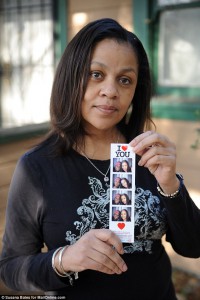Do the Legally Brain-Dead Have Rights?
The Rights of the Brain-Dead: A Legal Review of the Jahi McMath Case
When 13 year old Jahi McMath was admitted into Children’s Hospital Oakland on December 9th, 2013, she told her mother “something bad is going to happen to me.” Her mother assured Jahi that everything would be alright.
 Jahi was admitted into the hospital to treat her sleep apnea. The procedures were meant to improve Jahi’s breathing when she slept. Due to Jahi’s obesity, the treatment involved a complicated surgery procedure designed to remove her tonsils, uvula, and a portion of her turbinates.
Jahi was admitted into the hospital to treat her sleep apnea. The procedures were meant to improve Jahi’s breathing when she slept. Due to Jahi’s obesity, the treatment involved a complicated surgery procedure designed to remove her tonsils, uvula, and a portion of her turbinates.
Although the surgeries were initially successful, she was moved from the hospital’s recovery room to its ICU when she began bleeding from her mouth and nose. She was placed on a ventilator to help her breathe. Jahi went into cardiac arrest, which cut off oxygen to her brain for an unknown period of time. On December 12th, the hospital declared her brain dead. The hospital provided Jahi’s family with grief counseling through a staff chaplain.
According to federal law, a person is brain dead if there is irreversible cessation of brain activity, including the brain stem. A brain-dead person is legally dead, thus mandating that life-support systems be removed. However, Jahi’s family petitioned the courts to keep their daughter on the ventilator in the hopes that she would make a recovery. Judge Grillo appointed experts to testify. The experts confirmed Children Hospital’s declaration of brain death. However, an appeal court extended Jahi’s ventilator use.
On January 3rd, 2014, the coroner’s office issued a death certificate for Jahi McMath, with the date of death December 12th, 2013. She was released to the custody of her family, who moved her to an unknown faculty. The family has released Internet videos of Jahi lying in bed. Her family claims she is still alive because she is still breathing and she reacts when they touch her foot with ice. However, breathing and reaction to pain can be controlled by other parts of the body, such as the spine, when the brain is not properly functioning.
The Family’s Rights
Jahi’s family is keeping Jahi alive in the hope that there will be a miracle. The medical community has been very firm on its stance that brain-dead people are dead because there is absolutely no chance of recovery. Although patients in a permanent vegetative state are kept on life support, they still show signs of brain activity and thus there is a slim chance that they can recover.
This case has been categorized as a fight between religious belief and modern medicine. This is a distortion of Jahi’s story. Many parents in the same situation may want to keep their daughter on life support, regardless of religious belief. Jahi’s attorney played up the religious belief aspect as a means of challenging the federal definition of brain-death, but the courts will defer to the medical community when medical terms are called into question. Judges simply lack the expertise to make this type of factual finding. The fact that Judge Grillo felt compelled to appoint his own experts underscores the deference that courts show doctors and other medical experts.
Some people might believe that keeping Jahi on a ventilator is a waste of money and is disrespectful to her. I agree that keeping Jahi on a ventilator when another patient could need the machine is wrongful, but Congress has consistently passed laws which discount the influence of money when life is medically at stake. We should continue putting life ahead of the almighty dollar. That doesn’t mean Jahi couldn’t have been removed from life support for other reasons, but money should never be the reason.
There is also speculation that the family is keeping Jahi “alive” so that they can collect more money on her “pain and suffering” or her “loss of earnings” if they sue the Children’s Hospital for medical malpractice. It is unlikely they could recover on those types of claims. First, Alameda County courts have already determined that she died when she was declared brain-dead on December 12th. Her pain and suffering, as well as her future, ended when she died.
Furthermore, only Jahi could have sued for pain and suffering or loss of earnings because any money awarded for those claims would have gone directly towards her care. A dead person doesn’t need money for care. Her parents cannot claim pain and suffering or loss of future on their daughter’s behalf.
The only right her parents can claim is the right to keep their child with them, provided her corpse doesn’t endanger the health of others. The Supreme Court has ruled that individuals cannot be forced to endure medical treatment against their will because that would be battery. However, Jahi will never be able to give her consent or lack thereof, so there is really no issue with her parents keeping her body in a bed indefinitely. Jahi’s parents are clearly in denial about her death. Letting them grieve in private is the best thing we can do for them now.


Comments